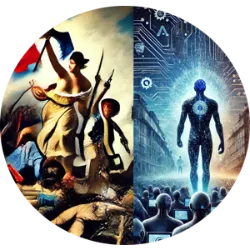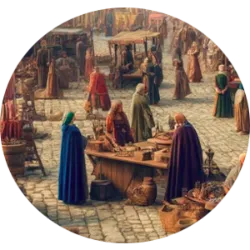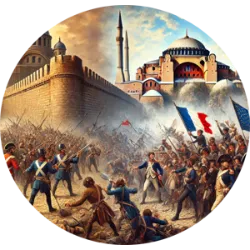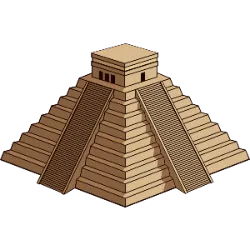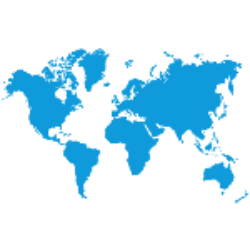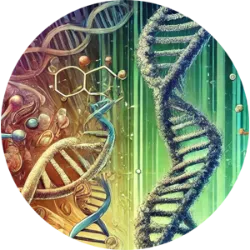French Revolution (1789-1799)
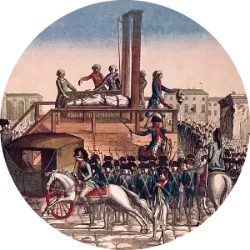
The French Revolution, which began in 1789, was a historic event that profoundly transformed France and had a global impact. The financial crisis, aggravated by the public debt and excessive spending by the monarchy, led to severe food shortages and popular discontent. The nobility and the clergy maintained their privileges, while the Third Estate (peasants, bourgeoisie and urban workers) suffered from high taxes and economic hardship.
The movement began with the convocation of the Estates General, where the Third Estate rebelled and formed the National Assembly. On 14 July 1789, the fall of the Bastille symbolized the beginning of the struggle against absolutism. In 1791, France proclaimed the Constitution and became a constitutional monarchy.
However, the regime of Louis XVI was unable to sustain itself. In 1792, the monarchy was abolished and the Republic was proclaimed. The Revolution entered a radical phase with the rise of the Jacobins and the execution of the king. During the Reign of Terror (1793–1794), thousands of opponents were executed, including figures such as Robespierre.
The Revolution culminated in the coup of 1799, when Napoleon Bonaparte took power, ending the revolutionary period and ushering in the Empire.
Napoleonic Wars (1803-1815)
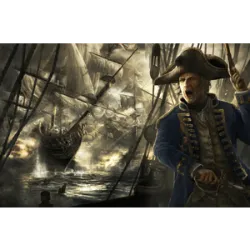
The Napoleonic Wars (1803–1815) were a series of conflicts between France, led by Napoleon Bonaparte, and several European coalitions. After crowning himself emperor in 1804, Napoleon expanded his rule, conquering territories and reforming governments based on the ideals of the French Revolution.
French military supremacy was evident in battles such as Austerlitz (1805), where Napoleon defeated Austria and Russia. However, the attempt to weaken the United Kingdom economically with the Continental Blockade failed, generating resistance within Europe itself. In 1812, the invasion of Russia was a disaster for the French, resulting in the loss of much of the army due to the harsh winter and the Russian scorched earth strategy.
In 1814, after successive defeats, Napoleon abdicated and was exiled to the island of Elba. He returned in 1815 in the episode known as "The Hundred Days", but was definitively defeated at the Battle of Waterloo. Captured, he was exiled to the island of Saint Helena, where he died in 1821.
The Napoleonic Wars redefined European borders and led to the Congress of Vienna (1815), which reorganized the balance of power on the continent, influencing world politics for decades.
Test yourself with one of these challenges 👇
Discover some interesting facts about Contemporary Age
Latin American Independences (1810-1825)
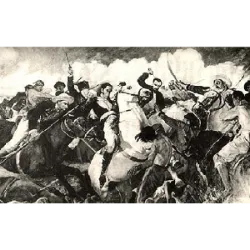
Between 1810 and 1825, Latin America underwent an intense process of independence, ending centuries of European colonial rule. Inspired by the American and French Revolutions, as well as Enlightenment ideas, independence movements gained strength, driven by the weakening of the European crowns due to the Napoleonic Wars.
The struggle began with the May Revolution in Argentina (1810) and the independence of Venezuela, led by Simón Bolívar, who played a crucial role in the liberation of several nations. In Mexico, Miguel Hidalgo started the rebellion in 1810, which culminated in independence in 1821, under the leadership of Agustín de Iturbide. In Brazil, the process was peaceful, with Dom Pedro I proclaiming independence in 1822.
The decisive battles took place in Ayacucho (1824), where the Spanish were defeated, guaranteeing the liberation of Peru and consolidating South American independence. In 1825, Bolivia became the last country to free itself from Spanish rule.
The independence movement changed the political landscape of Latin America, forming new nations, but also leaving challenges such as political instability and territorial disputes, which marked the continent in the following years.
Industrial Revolution (18th and 19th centuries)

Between the 18th and 19th centuries, the Industrial Revolution revolutionized the global economy, replacing artisanal production with machines and factories. The process began in England, driven by innovations such as James Watt's steam engine, the mechanization of the textile industry, and the expansion of railways.
The growth of cities accelerated, with millions of people migrating from the countryside to urban centers in search of work. Large-scale production increased the supply of goods, making products more affordable. However, working conditions in factories were precarious, with exhausting workdays, low wages, and child exploitation.
Industrialization expanded to other countries, such as France, Germany, the United States, and Japan, boosting capitalism and changing the political and social landscape. New inventions, such as the telegraph and the steam locomotive, expanded communications and transportation.
Despite the progress, the Industrial Revolution brought challenges such as pollution and social inequality. The labor movement emerged to demand better working conditions, giving rise to labor laws and trade unions. The impact of the Industrial Revolution shaped the modern world, driving technology and the global economy.
Unification of Germany (1871)
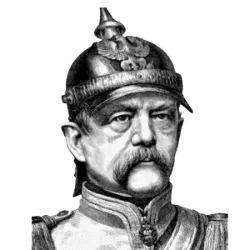
On 18 January 1871, Germany was officially unified, marking the emergence of a new European empire under Chancellor Otto von Bismarck and King William I of Prussia. The unification process was the result of a series of strategic wars led by Bismarck, who used diplomacy and military power to consolidate the German states under Prussian leadership.
The first stage was the War of the Duchies (1864) against Denmark. This was followed by the Austro-Prussian War (1866) which consolidated Prussian leadership over the northern German states. The final stage was the Franco-Prussian War (1870–1871), which mobilized strong German nationalist sentiment and led to the defeat of France.
The unification was proclaimed at the Palace of Versailles in France, symbolizing the Prussian triumph. The German Empire emerged as an industrial and military power, altering the balance of power in Europe and increasing rivalries, especially with France. The new Germany quickly became a major player in international politics, influencing events that would culminate in the First World War.
World War I (1914-1918)
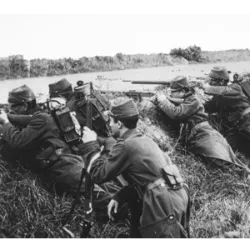
Between 1914 and 1918, the First World War devastated Europe and marked the beginning of the great conflicts of the 20th century. The trigger was the assassination of Archduke Franz Ferdinand, heir to the Austro-Hungarian Empire, on June 28, 1914. The event triggered a complex web of alliances, pitting the Triple Entente (France, the United Kingdom, and Russia) against the Triple Alliance (Germany, Austria-Hungary, and Italy, which later switched sides).
The war was characterized by violent battles, with the use of trenches, heavy artillery, and new technologies such as tanks and airplanes. The conflict reached its peak with the entry of the United States in 1917, weakening Germany and its allies. With millions of deaths and massive destruction, the war ended on November 11, 1918, with the signing of the armistice.
The Treaty of Versailles (1919) imposed severe punishments on Germany, redefined borders and created the League of Nations. However, the discontent generated by the harsh sanctions contributed to the rise of Nazism and the outbreak of World War II years later.
Russian Revolution (1917)
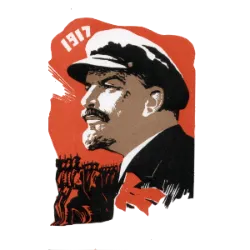
In 1917, Russia experienced a revolution that overthrew the Tsarist regime and ushered in the communist era. Dissatisfaction with the monarchy of Nicholas II was growing due to the economic crisis, famine and the country's disastrous participation in the First World War.
In February, workers' protests and soldiers' revolt forced the Tsar to abdicate, establishing a provisional government led by Alexander Kerensky. However, instability persisted and paved the way for the Bolsheviks, led by Vladimir Lenin. In October, the Communist Party seized power in a coup known as the October Revolution, establishing a socialist government based on Marxist ideals.
The new regime withdrew Russia from the war and initiated radical reforms, such as land expropriation and nationalization of the economy. The Russian Revolution resulted in a bloody civil war between the Bolsheviks and their opponents, consolidating the creation of the Soviet Union in 1922. The event transformed global politics and influenced socialist movements around the world, beginning the polarization between capitalism and communism that would mark the 20th century.
Test yourself with one of these challenges 👇
HOME
